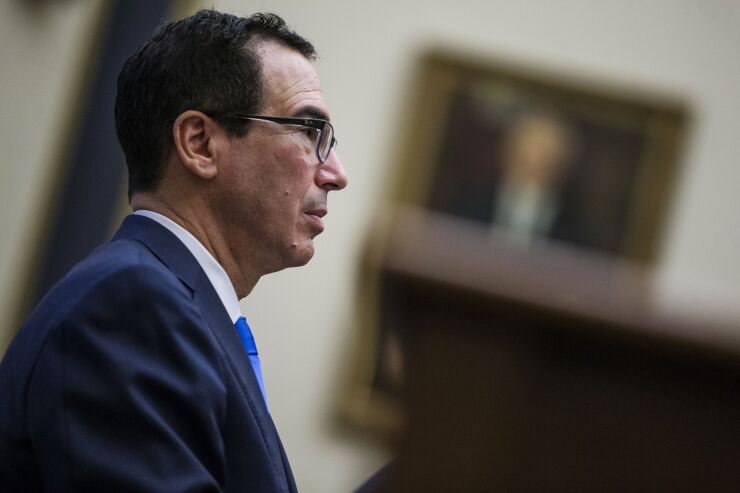WASHINGTON — The Financial Stability Oversight Council has identified the growth of nonbank mortgage origination and servicing as a new risk to the U.S. financial system, according to the interagency council’s annual report issued Wednesday.
The report, which Treasury officials said in theory could be a blueprint for future regulation, pinpoints 12 possible areas where the financial system is vulnerable and provides recommendations to regulatory agencies for mitigating any risk. The council issued the report on the same day it finalized March guidance on the FSOC's process for designating specific nonbanks for tougher supervision.
While nearly all of the identified vulnerabilities were unchanged from last year’s report, the council did add the increasing share of mortgages held by nonbank mortgage companies to the list of concerns.
Of the 25 largest originators and servicers, nonbanks originate and service about half of U.S. mortgages, a marked jump from 2009, in which nonbanks were responsible for originating just 10% of mortgages and servicing just 6%.

This is cause for concern, FSOC members say, because generally nonbank mortgage companies are not as well equipped as banks are to absorb adverse shocks, and rely more on short-term funding.
In the event of a financial downturn, nonbanks could be ill-prepared to deal with any stress, given that their primary assets — mortgage servicing rights — are often pledged as collateral. It can be challenging to price those assets when default rates are high. Nonbanks also have about four times as much debt as equity, according to the FSOC’s report.
“If delinquency rates rise or nonbanks otherwise experience solvency or liquidity strains, their distress could transmit risk to the financial system,” the report said.
The FSOC — created by the Dodd-Frank Act to monitor for systemic risks and now chaired by Treasury Secretary Steven Mnuchin — recommended that federal and state regulators work to collect data, identify risks and bolster oversight of nonbank mortgage companies in light of their growing share in the marketplace. The report also encouraged regulators to address the potential risks of those companies.
Leveraged lending also “remains a key area of focus” for the council, the report said. The rate of nonbank financial debt to GDP is historically high, and a large share of that debt is thought to be held by borrowers with low credit quality.
The banking regulators have also expressed concern about the lack of data on nonbank corporate credit holders, and the FSOC highlighted a particular need for data on direct and indirect exposures of holders of leveraged loans, the effects of potential liquidity risk in certain mutual funds and credit derivative exposures.
Cybersecurity is still a key risk as well, according to the report.
“Greater reliance on technology, particularly across a broader array of interconnected platforms, increases the risk that a cybersecurity event will have severe consequences for financial institutions,” the FSOC said.
A destabilizing cybersecurity failure could interrupt a critical financial service or utility, compromise the integrity of essential data and weaken consumer confidence, all of which could threaten the safety and soundness of the financial system.
At an FSOC meeting Wednesday in which members voted to approve the report, the council also voted to finalize a new process for designating nonbanks as systemically important financial institutions, emphasizing a preference for activities-based regulation of nonbanks.
The council had





